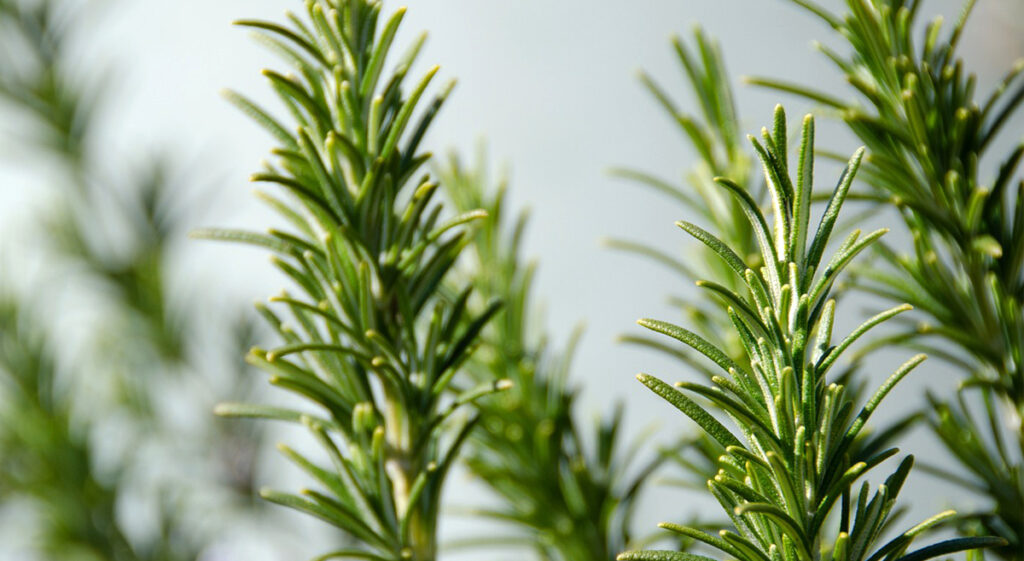You can easily make rosemary tincture yourself by soaking the herb in a mixture of alcohol and water.
You can use the tincture to reduce inflammation, relieve pain and protect the immune system, among other things.
Later in the blog I will give you an overview of what it can be used for, among other things.
The rosemary plant
Rosemary (also called Rosmarinus officinalis) is an aromatic perennial woody evergreen, with narrow leaves that somewhat resemble needles. When the plant blooms, blue white purple flowers appear, or sometimes even pink, depending on the kind.
Perhaps rosemary is now best known as an herb in Italian cuisine, but it has actually been used for centuries. Like the essential oil contained in the plant was used to improve memory. And among the Greeks and Romans, the herb was already a symbol of love, loyalty and friendship.
The healing effect of rosemary
Many healing properties are attributed to this plant; It strengthens the circulatory system and balances the nervous system and has antioxidant properties and helps with bacterial infections, inflammations and fungi.
Some examples are:
- Provides mental relaxation and confidence
- Helps improve your mood
- Improves brain function
- Protects the brain during stress and over stimulation
- Supports chronic fatigue
- Helps with depression and exhaustion
- Works physically calming, warming and strengthening
- Supports recovery after illness
- Reduces headaches
- Helps with acne
- Ensures a good fluid balance and is diuretic
- Promotes digestion and appetite
- Helps with upper abdominal cramps
- Relieves gas formation
- Has a supported effect for good blood circulation
- Regulating blood pressure
- It can have a stimulating effect on rheumatism and gout.
- Helps with menstrual pain or missed periods
- Good for airways and improves asthma
- Protects the skin and provides support or even heals skin conditions
- Helps reduce cough
- Fights arthritis
When your homemade tincture doesn't help
Rosemary is known to be the herb with the most antioxidant properties and can fight fungus, bacteria and inflammation.
In some serious conditions, such as cancer and some of the conditions mentioned above, very high concentrations are used and are only used by medical professionals. As a result, with daily self-use, the healing effect on these types of diseases will be unlikely!
That is why it is important to always consult a doctor or other specialist in the event of specific (serious) complaints and problems.
What is a Tincture?
A tincture is a liquid extract that is made with plants or flowers and the alcohol ensures that a multitude of the active substances from these plants and/or flowers are dissolved in the alcohol. The water causes the cell walls of the plants to swell so that they can better release their active ingredients.
For example, if you use 40% alcohol vodka, 60% of this is already water.
To make rosemary tincture
This is what you need:
- Fresh or dried rosemary herb
- Vodka or grain alcohol
- Glass jar with lid
- Bottle with a pipette
Step by step instructions:
- First rinse fresh rosemary and remove the stems
- Finely chop fresh herbs and use a mortar with dried herbs
- Fill the glass jar with rosemary herb to about half of the jar (1:2) with fresh herbs and to one-fifth with dried herbs (1:5).
- Pour the vodka into the jar until the spices are completely covered and there is about an inch of liquid on top.
- Stir everything with a clean spoon
- Close the jar tightly with the lid
- Shake the jar vigorously to mix the rosemary herb and alcohol
- Store the jar in a cool, dark place for 4-6 weeks, shaking the jar every 2-3 days to mix the herbs and liquid
- After 4-6 weeks, strain the tincture through a fine sieve or cheesecloth into another container.
- Squeeze the herbs well to extract all the liquid
- If necessary, leave the extract overnight to allow it to settle. Sieve again the next day and use a finer sieve or filter if necessary
- Pour the tincture into a pipette bottle using a funnel
- Label the bottle with the name of the tincture and the date it was made
You can use the tincture to support your health.
However, it is advisable to consult a doctor or other specialist before adding new supplements to your diet.
Type of jar and bottle for your tincture
Use a sterilized mason jar with a glass lid or stainless steel lid to soak your tincture. Do not use plastic bottles or lids as the plastic can integrate with the alcohol in your tincture.
Sterilized glass vials of dark brown or green color are best because they protect the tincture from ultraviolet light. Also make sure you have a pipette/dropper cap as a tincture is very concentrated and you only need small amounts.
After you have made the tincture, you can store it for up to 2 years.
General dosage:
3 x 10-15 drops per day in some water.
1x daily during or after breakfast, 2x daily before lunch and dinner
It is advised to stop after 2 weeks of use for 10 to 14 days and then continue after 3 to 4 weeks.
What you should pay attention to when using rosemary tincture:
Do not use if you are pregnant and it is also better not to take it on an empty stomach.
And in case of specific (serious) complaints or illness, always consult a doctor or other specialist. Also if you have high blood pressure or epilepsy.
A few more facts about rosemary.
*The plant originates from the Mediterranean region and cannot withstand hard frost very well, but can grow well in the Netherlands for example. As long as the plant is not too moist, it can overwinter in the cooler countries.
*The plant grows to about 1 meter in height.
*If the plant is outside, it flowers from May and if the plant hibernates frost-free from March.
*You can harvest young shoots all year round, but July and August are best when they are most aromatic. And in the spring it is best to prune heavily so that the plant does not lignify and you get bald spots.
*In addition to the Greeks and Romans, the plant was also considered sacred by the ancient Egyptians and Hebrews.
*The plant used to be used in bridal bouquets or used in a birth ritual, for example. But also at funerals as a symbol for remembering the deceased person.
*Rosemary oil, not the tincture, is also commonly used in air fresheners. The scent of the essential oil is said to have a stimulating effect and stimulate concentration. Ideal for the office or when you are studying.
Hi, my name is Jolinda, and I work as a holistic health practitioner. I provide yoga and meditation classes and massage and Reiki treatments, mindfulness training and happiness coaching,.
With my blogs I hope to inspire you to make positive changes into your life. For more ideas and tips check out my page Jolindas inspiration. Free trainings and videos you can find at free downloads and videos
Would you like to be kept informed and inspired? Then sign up for my newsletter.

